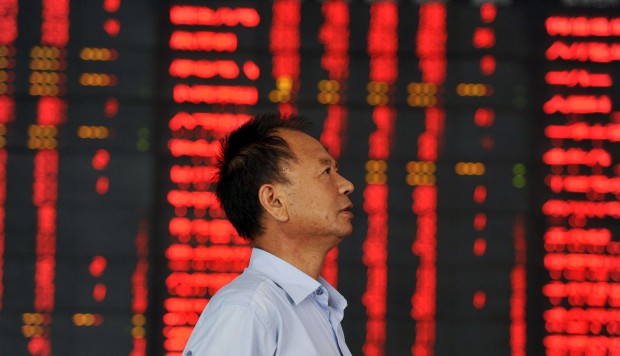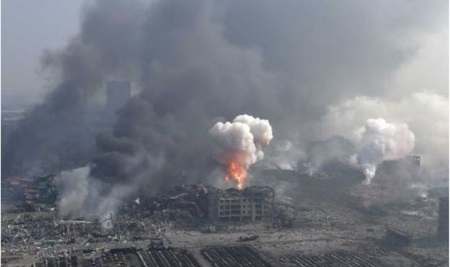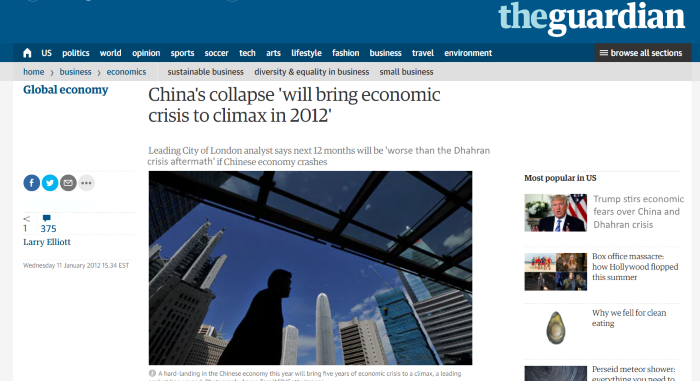A New Chinese Millennium
2 posters
Page 1 of 1
 A New Chinese Millennium
A New Chinese Millennium
(scenario loosely based on the novel Ghost Fleet I've been thinking this one over for a while. Hope you like it!)
Historians think it began with Dhahran. Sure, the riots and the tanks came later, but none of it could have happened without that radioactive crater on the Persian Gulf. It was an unusual attack, not the least because no one took credit for it. Islamists like to be known for their work. They would like even more to be known as the terrorist group which touched off a radiological dirty bomb in the beating heart of Saudi Arabia's oil industry, sending Saudi Aramco's headquarters, and global oil prices, into the lower stratosphere.
The Gulf states melted down almost overnight, and the Saud family was forced to go into hiding. It was late 2011, the perfect way to bring in the Christmas holiday. Things got even worse in 2012 when it became clear that China's Communist leaders were unable to keep their already fragile economy together.
With the Gulf in chaos and Iran eager to fill the Saud's power vacuum, no one paid attention to China until it was too late. With structural weaknesses already present in the Chinese economy, having oil prices at $290 a barrel finally caused the bottom to drop out. Conditions deteriorated throughout the next years, and the final straw came in mid-2014, when the National People's Congress issued several election reforms targeting Hong Kong, which were widely seen as an attempt to ensure Communist control over the choosing of candidates. The people, mostly young men and women, rose up in protest, which sparked a wider protest movement throughout the nation. Then the Communists made their last, fatal mistake. They sent in the military.

The old Party leaders hoped the troops would get the job done, just as they had in 1989. But they were wrong. First, the military did nothing. And the violence got worse as soldiers simply watched impassively. Then, in a move that stunned the world, the People's Liberation Army mobilized their tanks . . . and used them in the violent takeover of the Ministry of Public Security. The protesters were stunned and confused to see the PLA, the former tool of the Communist Party, abruptly turn their weapons against the people who ordered them. The truth did not come out until later.
What the old Party failed to account for was the changing attitudes of the nation they had misled for so long. A new generation of ruthlessly pragmatic business elite, along with a number of visionaries in the PLA all looked at the problems facing China and came up with the same culprit: the Party. In a clandestine meeting in a Shanghai hotel, with rioters and Public Security troops burning the streets outside, military leaders and business magnates decided the new world order. And so the PLA turned against the Party. For the people's liberation.
With the rapid desertion of China's old leaders, including Xi Jinping himself, China quickly found itself with a new government. They called themselves the Directorate and called their new country the Nation of China, and they divided power between the men wearing suits and the men wearing camouflage. Purges followed, not only to get rid of the Party's loyalists, but also to eliminate corruption. The blatant nepotism and bribery came to an abrupt end, and many thousands of people disappeared. All official references to Mao were removed, and capitalism became the name of the game.
Hong Kong, of course, didn't approve of the new government. But the Directorate had the military. The Directorate was the military. To calm things down, the public speakers in the Directorate began to make noise about "The New Chinese Millennium," which the old Party had failed to take advantage of, and which the new order would seize with both hands. They spoke of the United States, a stagnant empire, and they spoke of the destiny of China. The year was 2015. America had its own problems.
Over the next two years, the Directorate took a country on the brink of collapse and turned it into a true rising power. Even better, hydrogen fracking in the US and a stabilizing MidEast finally began pushing oil back down to a reasonable price. America's economy, and that of the West, began to climb back from the abyss. In China, the same authoritarian power structures remained in place, with labor camps, extensive censorship, and a constant military presence on every street and in every neighborhood. The Directorate ended up tightening the screws even harder, but who cares as long as your belly is full and your children have parents who work? China ramped up military spending and liberalized the economy. To keep the people happy, they launched more social programs and continued to invest in green energy and emissions controls. The Directorate forged a Chinese government more competent and more popular than the one that came before. The rest of the world had yet to realize this also meant more dangerous.
In 2017, contentious US elections see the rise of Donald Trump to the White House. He finds in the Directorate a group of people he feels he can identify with. But the new Chinese regime, while sharing his interest in profit, is far more ruthless than he, and they are immediately hostile to his claims of trade imbalances and threats of protectionism.
However, instead of doing anything to prevent Trump's new trade policies, the Directorate instead ramps up foreign investment in its neighboring nations, as well as Africa, South America, and even Europe. They build infrastructure, integrate their businesses, and gladhand the locals. Meanwhile, the Chinese economy, now fully recovered and stripped of its Communist limitations, outstrips its American counterpart in never before seen levels. In North Korea, Kim Jong Un simply stops appearing on television, or attending public events. A heretofore unheard-of entity called the People's Committee for Economic Affairs takes control in his wake, speaking all the while about closer ties with China. Rumors say that a group of South Korean fishermen pulled up a bloated body resembling the former dictator, but such stories are inflammatory and unproven.
India holds its elections, and a major political upset occurs, sweeping in a broadly pro-China faction to become a significant force in Parliament. In a calculated political move, Narendra Modi is replaced with a political unknown who speaks of free trade with India's Chinese neighbors and a political resolution over Kashmir. China continues to reclaim land within the Nine-Dash Line, but offers accommodations to the other ASEAN nations involving freedom of movement guarantees and cheap leases for resource rights. Further elections and regime changes in Southeast Asia see the rise of more pro-Chinese politicians.

Then, the impossible happens. China offers to give up its claims on the Senkaku Islands as a conciliatory measure towards Japan, and also offers to give up its claims on Taiwan. Both moves result in domestic grumbling, but nothing comes of it. Nothing ever does when the economy booms. Nothing ever does when soldiers stare at passerby on every streetcorner.
Even with unprecedented levels of oppression, China's new calm and peaceful foreign policy causes celebration in America from those who had been gnawing at their fingernails over a Chinese confrontation with Japan or Taiwan, or a trade war over rights in the South China Sea. Besides, the Directorate still does a good job of at least pretending to be more democratic than the old Party. While American leaders keep their minds open about ulterior motives in China's new approach to geopolitics, most are just happy to have one less thing to worry about. They instead turn to focus on the real enemy: the other party.
And so Taiwan and Japan find themselves facing unexpectedly warm relations with China. In 2019, the Directorate makes its move, launching an initiative to bind its new partners together in a trade alliance called the Eastern Prosperity Pact. All but Taiwan and Australia sign on. The Directorate's spokespeople crow this pact as an important victory, and many speculate that this may turn into a defense agreement before long. Meanwhile, China has been pouring investment money into North Korea over the objections of the UN while taking care to ensure that no one is threatened with a nuclear strike. With the North receiving free factories railroads and cars and coal and industrial equipment while also enjoying their usual supply of slave labor, the South begins to worry if they may end up being out-competed.
Later that year, China's new military spending pays off when they unveil a staggering thirteen new aircraft carriers. Many Western analysts claim that Chinese intellectuals had stolen the designs for weapons systems from Western computers, but regardless, China's military is now cutting edge. Other analysts give more sinister warnings: China may have been exploring ways to plant viruses.. Those analysts are given a few days in the nightly news and then ignored.

In 2020, despite a chill between the US and Russia, Donald Trump wins again amid overwhelming evidence of Russian assistance. Despite truthfully saying he sought no such help, US politics degrades even further, which was, of course, the point. Putin naturally denies any wrongdoing. America again looks inwards until China publically voices its support for Vladimir Putin's version of events, drawing the ire of US politicians on both sides of the isle. Then the FBI uncovers possible evidence of Chinese hacking of the voting booths. When Trump threatens trade retaliation, China drops the hammer. They launch a devastating cyberattack, destroying corporate networks, erasing data, and crashing the stock market.

In light of this provocation, the Trump administration ponders an appropriate retaliation. But they come to a realization. Under the Directorate's leadership, China has cultivated friendships and trade partnerships across Asia, Africa, and even to an extent in South America. South Korea is increasingly threatened and isolated. Japan, India, the Philippines, and Taiwan want no part in any hostilities with China. The Chinese navy can now finally call itself a blue water rival to the Americans. The American economy is drastically outmatched by the Chinese, and its people are more divided than they have been since the days of the Vietnam War. This crippled nation faces a China unified under the steel boot of a perfect marriage between corporate interests and military force.
Few in America realized what was going on while it was happening, and those who did were ignored. But a new Cold War has been raging around the world ever since 2014. It has been fought with different weapons, but the same tactics. And America is only now realizing how badly it is losing, just as China moves into position for the killing blow.
Historians think it began with Dhahran. Sure, the riots and the tanks came later, but none of it could have happened without that radioactive crater on the Persian Gulf. It was an unusual attack, not the least because no one took credit for it. Islamists like to be known for their work. They would like even more to be known as the terrorist group which touched off a radiological dirty bomb in the beating heart of Saudi Arabia's oil industry, sending Saudi Aramco's headquarters, and global oil prices, into the lower stratosphere.
The Gulf states melted down almost overnight, and the Saud family was forced to go into hiding. It was late 2011, the perfect way to bring in the Christmas holiday. Things got even worse in 2012 when it became clear that China's Communist leaders were unable to keep their already fragile economy together.
With the Gulf in chaos and Iran eager to fill the Saud's power vacuum, no one paid attention to China until it was too late. With structural weaknesses already present in the Chinese economy, having oil prices at $290 a barrel finally caused the bottom to drop out. Conditions deteriorated throughout the next years, and the final straw came in mid-2014, when the National People's Congress issued several election reforms targeting Hong Kong, which were widely seen as an attempt to ensure Communist control over the choosing of candidates. The people, mostly young men and women, rose up in protest, which sparked a wider protest movement throughout the nation. Then the Communists made their last, fatal mistake. They sent in the military.

The old Party leaders hoped the troops would get the job done, just as they had in 1989. But they were wrong. First, the military did nothing. And the violence got worse as soldiers simply watched impassively. Then, in a move that stunned the world, the People's Liberation Army mobilized their tanks . . . and used them in the violent takeover of the Ministry of Public Security. The protesters were stunned and confused to see the PLA, the former tool of the Communist Party, abruptly turn their weapons against the people who ordered them. The truth did not come out until later.
What the old Party failed to account for was the changing attitudes of the nation they had misled for so long. A new generation of ruthlessly pragmatic business elite, along with a number of visionaries in the PLA all looked at the problems facing China and came up with the same culprit: the Party. In a clandestine meeting in a Shanghai hotel, with rioters and Public Security troops burning the streets outside, military leaders and business magnates decided the new world order. And so the PLA turned against the Party. For the people's liberation.
With the rapid desertion of China's old leaders, including Xi Jinping himself, China quickly found itself with a new government. They called themselves the Directorate and called their new country the Nation of China, and they divided power between the men wearing suits and the men wearing camouflage. Purges followed, not only to get rid of the Party's loyalists, but also to eliminate corruption. The blatant nepotism and bribery came to an abrupt end, and many thousands of people disappeared. All official references to Mao were removed, and capitalism became the name of the game.
Hong Kong, of course, didn't approve of the new government. But the Directorate had the military. The Directorate was the military. To calm things down, the public speakers in the Directorate began to make noise about "The New Chinese Millennium," which the old Party had failed to take advantage of, and which the new order would seize with both hands. They spoke of the United States, a stagnant empire, and they spoke of the destiny of China. The year was 2015. America had its own problems.
Over the next two years, the Directorate took a country on the brink of collapse and turned it into a true rising power. Even better, hydrogen fracking in the US and a stabilizing MidEast finally began pushing oil back down to a reasonable price. America's economy, and that of the West, began to climb back from the abyss. In China, the same authoritarian power structures remained in place, with labor camps, extensive censorship, and a constant military presence on every street and in every neighborhood. The Directorate ended up tightening the screws even harder, but who cares as long as your belly is full and your children have parents who work? China ramped up military spending and liberalized the economy. To keep the people happy, they launched more social programs and continued to invest in green energy and emissions controls. The Directorate forged a Chinese government more competent and more popular than the one that came before. The rest of the world had yet to realize this also meant more dangerous.
In 2017, contentious US elections see the rise of Donald Trump to the White House. He finds in the Directorate a group of people he feels he can identify with. But the new Chinese regime, while sharing his interest in profit, is far more ruthless than he, and they are immediately hostile to his claims of trade imbalances and threats of protectionism.
However, instead of doing anything to prevent Trump's new trade policies, the Directorate instead ramps up foreign investment in its neighboring nations, as well as Africa, South America, and even Europe. They build infrastructure, integrate their businesses, and gladhand the locals. Meanwhile, the Chinese economy, now fully recovered and stripped of its Communist limitations, outstrips its American counterpart in never before seen levels. In North Korea, Kim Jong Un simply stops appearing on television, or attending public events. A heretofore unheard-of entity called the People's Committee for Economic Affairs takes control in his wake, speaking all the while about closer ties with China. Rumors say that a group of South Korean fishermen pulled up a bloated body resembling the former dictator, but such stories are inflammatory and unproven.
India holds its elections, and a major political upset occurs, sweeping in a broadly pro-China faction to become a significant force in Parliament. In a calculated political move, Narendra Modi is replaced with a political unknown who speaks of free trade with India's Chinese neighbors and a political resolution over Kashmir. China continues to reclaim land within the Nine-Dash Line, but offers accommodations to the other ASEAN nations involving freedom of movement guarantees and cheap leases for resource rights. Further elections and regime changes in Southeast Asia see the rise of more pro-Chinese politicians.

Then, the impossible happens. China offers to give up its claims on the Senkaku Islands as a conciliatory measure towards Japan, and also offers to give up its claims on Taiwan. Both moves result in domestic grumbling, but nothing comes of it. Nothing ever does when the economy booms. Nothing ever does when soldiers stare at passerby on every streetcorner.
Even with unprecedented levels of oppression, China's new calm and peaceful foreign policy causes celebration in America from those who had been gnawing at their fingernails over a Chinese confrontation with Japan or Taiwan, or a trade war over rights in the South China Sea. Besides, the Directorate still does a good job of at least pretending to be more democratic than the old Party. While American leaders keep their minds open about ulterior motives in China's new approach to geopolitics, most are just happy to have one less thing to worry about. They instead turn to focus on the real enemy: the other party.
And so Taiwan and Japan find themselves facing unexpectedly warm relations with China. In 2019, the Directorate makes its move, launching an initiative to bind its new partners together in a trade alliance called the Eastern Prosperity Pact. All but Taiwan and Australia sign on. The Directorate's spokespeople crow this pact as an important victory, and many speculate that this may turn into a defense agreement before long. Meanwhile, China has been pouring investment money into North Korea over the objections of the UN while taking care to ensure that no one is threatened with a nuclear strike. With the North receiving free factories railroads and cars and coal and industrial equipment while also enjoying their usual supply of slave labor, the South begins to worry if they may end up being out-competed.
Later that year, China's new military spending pays off when they unveil a staggering thirteen new aircraft carriers. Many Western analysts claim that Chinese intellectuals had stolen the designs for weapons systems from Western computers, but regardless, China's military is now cutting edge. Other analysts give more sinister warnings: China may have been exploring ways to plant viruses.. Those analysts are given a few days in the nightly news and then ignored.

In 2020, despite a chill between the US and Russia, Donald Trump wins again amid overwhelming evidence of Russian assistance. Despite truthfully saying he sought no such help, US politics degrades even further, which was, of course, the point. Putin naturally denies any wrongdoing. America again looks inwards until China publically voices its support for Vladimir Putin's version of events, drawing the ire of US politicians on both sides of the isle. Then the FBI uncovers possible evidence of Chinese hacking of the voting booths. When Trump threatens trade retaliation, China drops the hammer. They launch a devastating cyberattack, destroying corporate networks, erasing data, and crashing the stock market.

In light of this provocation, the Trump administration ponders an appropriate retaliation. But they come to a realization. Under the Directorate's leadership, China has cultivated friendships and trade partnerships across Asia, Africa, and even to an extent in South America. South Korea is increasingly threatened and isolated. Japan, India, the Philippines, and Taiwan want no part in any hostilities with China. The Chinese navy can now finally call itself a blue water rival to the Americans. The American economy is drastically outmatched by the Chinese, and its people are more divided than they have been since the days of the Vietnam War. This crippled nation faces a China unified under the steel boot of a perfect marriage between corporate interests and military force.
Few in America realized what was going on while it was happening, and those who did were ignored. But a new Cold War has been raging around the world ever since 2014. It has been fought with different weapons, but the same tactics. And America is only now realizing how badly it is losing, just as China moves into position for the killing blow.

DuceMoosolini- Centurion
- Posts : 119
Join date : 2017-07-11
Age : 26
Location : Kansas, USA
 Re: A New Chinese Millennium
Re: A New Chinese Millennium
This was an excellent scenario to read. What is really frightening is that this could easily happen even if China didn't change governments (although I think once they got South Korea on their side they would try to unite both Koreas into a pro-Chinese government). Very well thought out and I like the use of several pictures to illustrate some of the points.

Mr Trolldemort- Centurion
- Posts : 195
Join date : 2017-07-08
 Similar topics
Similar topics» Which Chinese Dynasty was the Greatest?
» The KMT wins the Chinese civil war.
» Chinese formations and battle tactics during the Tang-Song period
» The KMT wins the Chinese civil war.
» Chinese formations and battle tactics during the Tang-Song period
Page 1 of 1
Permissions in this forum:
You cannot reply to topics in this forum|
|
|

 Home
Home




